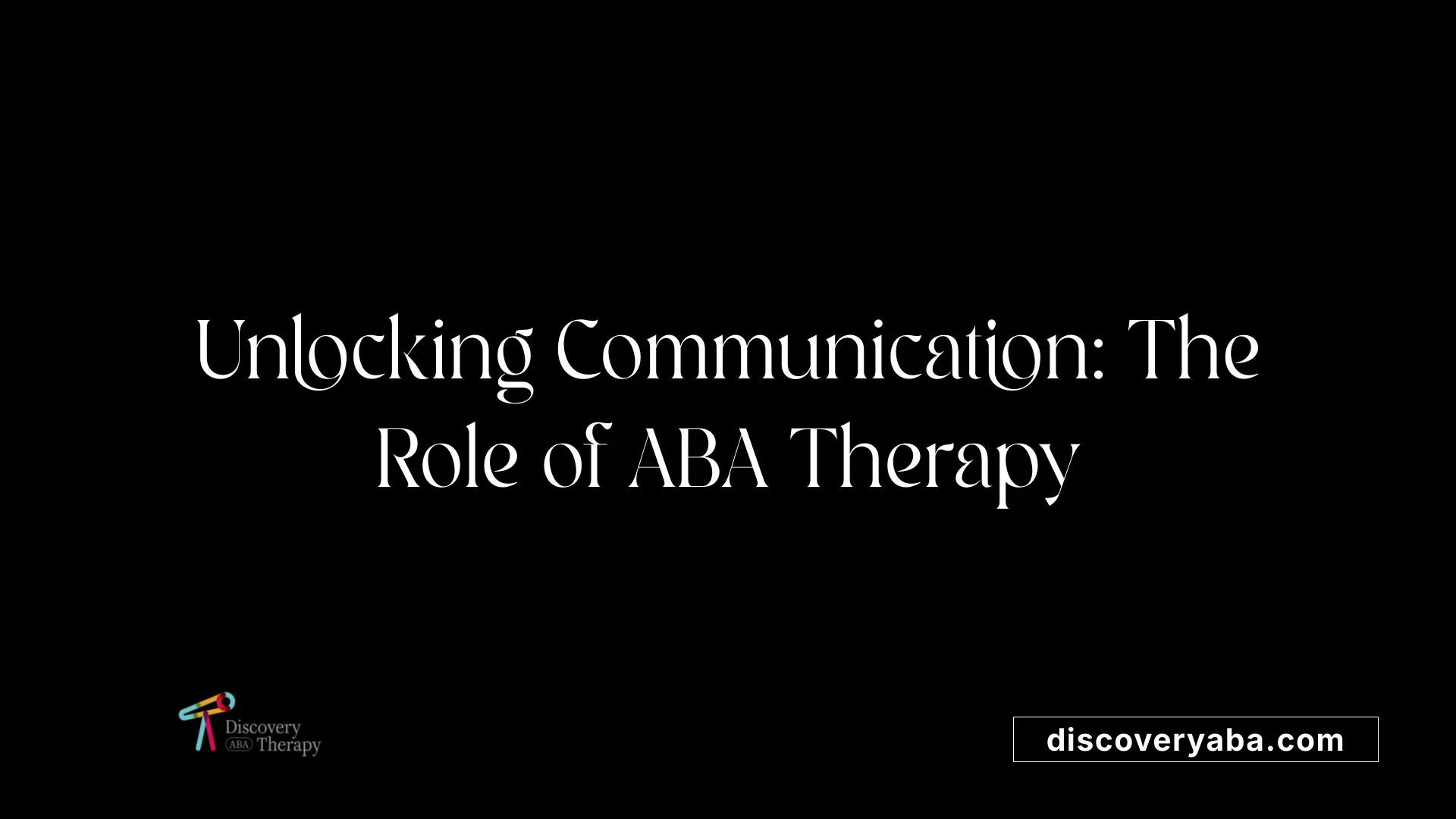How ABA Therapy Prepares Children for Adulthood and Independence
Unlocking Potential: ABA Therapy's Role in Autism and Independence

Exploring ABA Therapy
Applied Behavior Analysis (ABA) therapy is a scientifically proven approach to improving the lives of children with autism. This therapy encourages independence by teaching a range of essential skills, from basic self-care to complex social interactions. As a method designed to adapt and respond to each child's unique needs, ABA aids in preparing children on the autism spectrum for the challenges and responsibilities of adult life.
Foundational Communication and Social Skills

What are the benefits of ABA therapy in fostering communication, behavioral management, and social skills necessary for independence?
ABA therapy offers substantial benefits in helping children with autism develop foundational communication skills essential for independence. At a young age, particularly between 2-6 years old, starting the therapy sets the stage for enhanced social interaction. Children learn to effectively express their wants and needs, cooperate with peers, and establish social bonds, all of which are vital for navigating interpersonal relationships.
This structured approach focuses not just on basic communication, but also on behavioral management. Skills such as emotional understanding, patience, and appropriate self-introduction are targeted to improve social competence. Studies indicate that children receiving ABA therapy exhibit significant improvements in socialization and communication, which are crucial for successful adult life.
The methodology of ABA includes tailored interventions that actively involve family members. This participation is essential in reinforcing learned skills in a supportive environment. Through positive reinforcement and consistent practice, children become more adept at managing behavior in different social contexts.
Fostering these foundational skills through ABA therapy not only enhances day-to-day interactions but also cultivates greater independence. It puts the building blocks in place, preparing children for the complexities of adult life, where communication and social interactions are vital.
Key Areas of Focus:
By prioritizing these areas, ABA therapy significantly contributes to the development of necessary skills for a successful transition to adulthood.
Building Essential Life Skills Through ABA Therapy

Are there specific ABA strategies and interventions effective for promoting life skills and self-sufficiency in children with autism?
Yes, there are specific ABA strategies and interventions effective for promoting life skills and self-sufficiency in children with autism. Techniques such as task analysis break complex skills into manageable steps, which can significantly enhance a child's understanding and ability to execute these tasks. For example, when teaching a child to brush their teeth, the process can be divided into steps like getting the toothbrush, applying toothpaste, and brushing each section of the mouth.
Additionally, positive reinforcement is a pivotal element in ABA therapy. By providing rewards or praise for desired behaviors, children are encouraged to practice and master their skills, reinforcing their confidence and motivation. This method is especially effective for building independence in self-care tasks such as dressing, using the bathroom, or preparing simple meals.
To effectively foster skills like personal care and household management, ABA therapy often incorporates social skills training. This training helps children practice interactions and build communication abilities in structured settings, ensuring they can apply these skills in everyday situations.
Benefits of Self-Care Skills
The acquisition of self-care skills empowers children and supports their journey towards independence. Skills in areas like grooming and hygiene not only boost self-esteem but also enhance safety and personal responsibility. Celebrating successes, however small, plays an important role in motivating continued practice and reinforcing positive behaviors.
Key ABA Strategies Overview
Through these focused strategies, ABA therapy remains a critical tool in not only teaching essential daily skills but also in laying the foundation for a successful transition into adulthood.
Preparing for Adulthood: Vocational and Social Skills

How does ABA therapy assist children with autism in transitioning to adulthood?
ABA therapy plays a crucial role in assisting children with autism as they transition into adulthood by equipping them with essential life skills. One major area of focus is on improving communication and social interaction skills. This foundation is vital for navigating adult relationships and succeeding in workplace environments.
Building Vocational Skills
ABA therapy specifically targets the development of vocational skills crucial for employment. Skills such as task completion, teamwork, and problem-solving abilities are emphasized. These skills are taught through structured, personalized approaches that motivate children to engage in learning. Positive reinforcement effectively boosts confidence and encourages consistent practice of these essential skills.
Engaging Personal Interests
Understanding and identifying personal interests also play an important role in the transition process. Tailoring the learning experience around these interests can enhance engagement and motivation, making it easier for children to grasp and apply new concepts. Additionally, involving children in decision-making about their future promotes critical thinking, empowering them to take ownership of their path towards independence.
To summarize, ABA therapy supports the transition into adulthood by focusing on practical skills and social awareness. This systematic development ensures that individuals with autism are equipped not just with vocational abilities, but with the confidence necessary to integrate into adult life.
Addressing Challenges during the Transition to Adulthood

Challenges Faced by Autistic Teens
Transitioning into adulthood presents various challenges for teens with autism. One significant difficulty is developing social skills necessary for making friends and connecting with peers. Many autistic individuals struggle to interpret social cues, leading to feelings of isolation.
Additionally, managing daily living skills such as budgeting, cooking, and navigating public transportation can be overwhelming. Many struggle with independent decision-making, often relying heavily on parents or caregivers.
Role of ABA in Overcoming These Challenges
ABA therapy plays a crucial role in helping autistic teens navigate these challenges. By focusing on the development of essential life skills, such as personal care and financial literacy, ABA fosters greater independence.
Through structured support and positive reinforcement, teens learn how to handle daily tasks, empowering them to make decisions and tackle responsibilities. The use of task analysis breaks down complex skills into manageable steps, making learning more accessible.
Moreover, collaboration among therapists, educators, and families ensures a holistic approach to skill-building. Setting measurable goals within Individualized Education Plans (IEPs) directly addresses the unique challenges faced. As these teens practice skills in various environments, they become more confident and prepared for adult life.
Incorporating Parental and Community Support
Why is Parental Involvement Crucial?
Parental involvement is fundamental in the ABA therapy process. Parents can help create a supportive home environment where skills learned during therapy sessions are practiced consistently. This can significantly enhance the retention of skills and foster a sense of security in children. It’s important for parents to engage in their child's learning by setting small, achievable goals and encouraging autonomy in tasks such as self-care routines.
How Do Community Programs Contribute?
Community programs play a pivotal role in reinforcing the skills learned through ABA therapy. Such programs offer opportunities for children and adolescents with autism to socialize and apply their learned communication and life skills in real-world settings. Participation in group activities fosters engagement and enhances the development of social competencies.
What Does Consistent Skill Reinforcement Look Like?
Consistent reinforcement of skills is vital. This can be achieved through repeated practice at home and during community activities, helping the child to generalize skills across different environments. Environments that include family interactions, community events, and peer interactions provide varied contexts for skill application, which strengthens the learning process.
Recap on the Impact of Collaboration
A collaborative approach among therapists, parents, and community organizations ensures that children with autism not only learn essential skills but also feel fully supported as they navigate their developmental journey toward independence.
Using Customized Plans for Skill Acquisition
Individualized Plans
Customized plans form the backbone of effective ABA therapy, especially in the context of skill acquisition. These Individualized Education Plans (IEPs) are tailored to address each child’s unique strengths and needs, integrating specific life skills necessary for transition into adulthood. Educational teams, including educators, therapists, and parents, collaborate to create these plans, ensuring a well-rounded approach.
Goal Setting
Setting achievable and measurable goals is crucial in promoting a child’s sense of accomplishment. Clear targets for developing daily living skills, such as personal care and home management, help guide interventions and focus efforts. The reinforcement of small successes fosters confidence, motivating children to continue working toward independence.
Strength Assessment
Assessing individual strengths and preferences is essential when designing customized plans in ABA therapy. This assessment enhances engagement and motivation, as it aligns therapy with what interests the child most. By involving children in discussions about their goals, they also develop critical thinking and decision-making skills, preparing them for adult responsibilities.
The integration of these strategies—individualized planning, goal setting, and strength assessments—significantly empowers children with autism to acquire the life skills they need for independent living.
Celebrating Achievements to Build Confidence
Reinforcement of Positive Behavior
Celebrating small victories is essential in the process of ABA therapy. Every success, no matter how minor, reinforces positive behavior in children with autism. This practice helps children develop a sense of accomplishment and motivates them to pursue further skills. Positive reinforcement strengthens the belief that they can achieve their goals and gain independence.
Confidence Building
Building self-confidence is a critical component of ABA therapy. When children see their achievements acknowledged, it fosters a growing sense of self-worth. This confidence translates efficiently into their daily lives, encouraging them to tackle new challenges and engage more with others, thus promoting social development.
Task Achievement
Task achievement is another area where celebrating successes plays a significant role. Utilizing strategies such as task analysis, therapists break down skills into manageable steps, allowing children to experience success at each level. Upon completing these steps, celebrating achievements enhances motivation and the desire to learn more. By recognizing both small and significant milestones, children are more likely to master various skills, from personal care to daily living activities, contributing to their overall independence.
Long-Term Benefits and Community Engagement
Enhancing Public Transportation Skills
ABA therapy plays a vital role in equipping individuals with autism with the skills necessary to navigate public transportation. Mastering this aspect of daily life not only promotes independence but also empowers adults with autism to explore their communities. This skill set includes understanding schedules, recognizing routes, and managing fare payments, all of which foster a sense of autonomy.
Job Management and Workplace Adaptation
Moreover, job management skills are another critical focus of ABA therapy. Individuals learn how to interact within a workplace setting, manage time effectively, and fulfill job responsibilities. Training includes tasks like resume writing, interview practice, and appropriate workplace communication, which enhances their employability and ability to thrive in professional environments.
Building Adult Social Life
Social engagements are essential for personal development and well-being. ABA therapy aids in teaching social skills that adults need for forming relationships in various contexts, including friendships and community involvement. This could involve role-playing scenarios or identifying social cues, which enhances an individual's ability to connect with others socially.
The combination of these skills contributes to a fulfilling and independent adult life for individuals with autism, reinforcing the long-term benefits of ABA therapy.
The Importance of Early Intervention in ABA
Starting Young
ABA therapy is most effective when initiated at a young age, particularly between the ages of 2 and 6. During these formative years, children can develop crucial skills that will benefit them throughout their lives. Early intervention addresses communication and social abilities, allowing children to express their needs and build friendships—essential constructs for future interactions and relationships.
Decreasing Challenging Behaviors
One of the goals of starting ABA therapy early is to decrease challenging behaviors. Children learn to manage their emotions and frustrations through structured support, which can lead to increased social acceptance and personal satisfaction. By tackling these behaviors early, children have the opportunity to create a more positive environment for themselves and those around them.
Early Development
In these initial stages, ABA therapy focuses on foundational skills including self-care routines, such as toilet training and handwashing. Research has shown that developing these skills early on significantly improves children's independence and social skills later in adolescence and adulthood. This proactive approach not only fosters essential skills but also enhances self-esteem and confidence as children transition from structured environments to more independent settings.
Empowering Independence through ABA
ABA therapy provides a structured yet flexible framework that empowers children with autism to gain the skills necessary for adulthood. By starting early and tailoring approaches to individual needs, ABA offers an invaluable pathway to greater independence and improved quality of life. The integration of comprehensive skill development, community support, and celebration of progress makes ABA a cornerstone in preparing children with autism to face their future with confidence.
References
- How ABA Prepares Your Child for a Life Without You - The Place
- Preparing Your Child with Autism for Adulthood - AutismCOE
- How ABA Therapy Can Benefit Both Children and Adults
- How ABA therapy can help children with autism develop ...
- Unit 14: ABA and School-Ready Teens: Transitioning to Adulthood
- The effectiveness of applied behavior analysis program training on ...
- Moving to Prevent Disability in Adults With Lower Extremity Joint ...
Does Your Child Have An Autism Diagnosis?
Learn More About How ABA Therapy Can Help
Find More Articles
Contact us
North Carolina, Tennessee, Nevada, New Jersey, Utah, Virginia
New Hampshire, Maine
Massachusetts, Indiana, Arizona, Georgia
.avif)


































































































